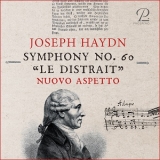Die fünf vorgestellten Werke sind nach Angaben der Ausführenden so in der Gegenwart noch nicht erklungen. Zwar gehört beispielsweise die Symphonie Nr. 60, Il distratto, zum Repertoire und auch zum Konzertleben. Aber in der hier zu hörenden Besetzung, die Haydns Zeitgenosse und Harfenist Pater Meingosius Gaelle aus Salzburg erstellt hat, erklingt sie zumindest eingespielt erstmalig. Auch heute noch bekannt sein dürfte ein weiterer Zeitgenosse und Harfenist, nämlich Johann Baptist Krumpholz. Von ihm stammen die Variationen zu der französischen Ariette ‘Je ne vous dirais point: j’aime’, ein Zitat aus der Symphonie Nr. 53, L’Impériale. Das Thema erschien zuerst als schlichte Lied-Romanze, deren Verfasser anonym blieb.
Diese Bearbeitungen zeichnen sich durch eine instrumentale Leichtigkeit aus, die daneben durch die ungewöhnliche Instrumentation mit Harfe und Saltiero, einer Zither, auffallen. Das Ergebnis ist ein anregendes Projekt, das die Stücke in ungewohnter Form präsentiert.
Das vor zehn Jahren von Michael Dücker sowie Johanna und Elisabeth Seitz gegründete Ensemble Nuovo Aspetto wird seinem Namen gerecht, wenn es ungewöhnliche Besetzungen früherer Werke entdeckt, spielt und neue Höreindrücke auf scheinbar Bekanntes ermöglicht. Das gilt auch im Hinblick auf die Besetzung mit Salterio, Harfe und Laute. So geben sie den Werken ein eigentümliches Gepräge, das die Ohren animiert, sich neu hinein zu vertiefen. Mit ihrer leichthändigen, aber immer sauber arrangierten Spielweise sorgen sie für eine veritable Bereicherung.
Die Sopranistin Hannah Morrison tritt als Solistin für drei Gesangspartien zur Gruppe hinzu, so dass diese Werke die Symphonie und die Cassation, bzw. Concertino, einrahmen. Mit ebenso eleganter und feiner Lesart lässt sie die gesungenen Melodien glockenhell erklingen.
According to the performers, the five works presented hon this Prospero CD have not yet been heard in this form in present times. It is true, for example, that the Symphony No. 60, Il Distratto, is part of the repertoire and also of concert life. But the instrumentation made by Haydn’s contemporary and harpist Pater Meingosius Gaelle from Salzburg is heard for the first time on disc. Another contemporary and harpist, Johann Baptist Krumpholz, is also known today. The variations on the French ariette ‘Je ne vous dirais point: j’aime’, a quotation from the Symphony No. 53, L’Impériale, originate from him. The theme first appeared as a simple song-romance whose author remained anonymous. Dücker has re-edited the original arrangements found in the Augsburg Lute Codex, also adapting them to modern times.
These arrangements are characterized by an instrumental lightness, which, in addition, is striking due to the unusual instrumentation with a lot of harp and saltiero, a zither. The result is a stimulating project, presenting the pieces in an unusual form.
The ensemble Nuovo Aspetto, founded ten years ago by Michael Dücker as well as Johanna and Elisabeth Seitz, lives up to its name when it discovers and plays unusual instrumentations of earlier works and enables new listening impressions of seemingly familiar music, especially with regard to the instrumentation with salterio, harp and lute. In this way they give the works a peculiar character that animates the ears to delve into them. With their light, but always cleanly arranged playing, they clearly provide an enrichment.
Soprano Hannah Morrison joins the group here as soloist for three vocal parts, so that these works frame the Symphony, the Cassation and the Concertino, respectively. With an elegant and refined reading, she makes the sung melodies ring as clear as a bell.






















